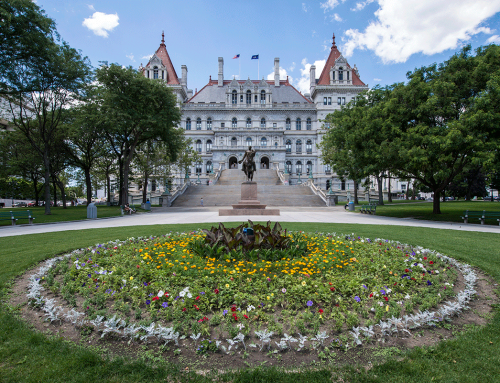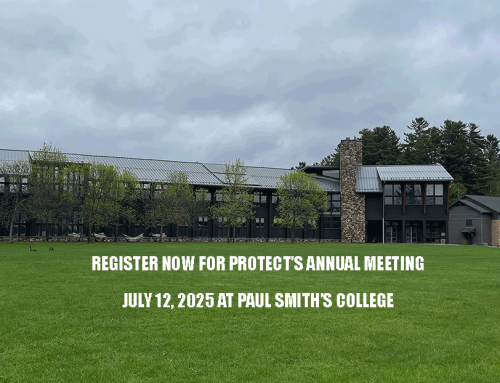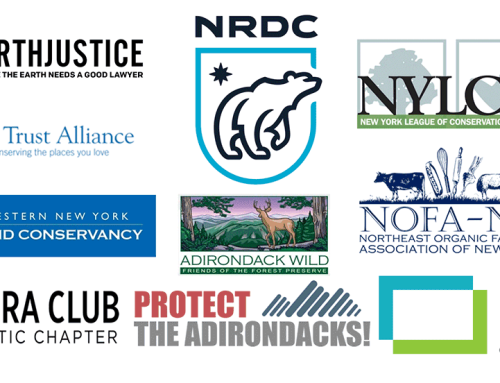No state permits have been issued to date
Two recent media accounts (here and here) about the status of the Adirondack Club & Resort (ACR) project in Tupper Lake have written about “permits” having been approved for the 6,000-acre project in Tupper Lake. In point of fact, zero permits have been issued for this project by the Adirondack Park Agency (APA), the Department of Environmental Conservation (DEC) or the US Army Corp of Engineers (ACoE). Only the Town of Tupper Lake has issued actual permits to the developers.
In January 2012, the APA issued an “Order” approving the ACR project that was contingent on the ACR developers meeting certain criteria, including completion of an amphibian impact study, before any permits could be issued. The APA has posted the unsigned and undated potential permits for the 14 segments of the ACR project on its website. The front page of the APA website has a section on the Adirondack Club & Resort project that reads “Authorized Permits” but a click on any of the permits shows them to be unsigned and undated.
Recently, to clarify this issue, 20 months after the APA approval, PROTECT submitted a Freedom of Information Law request to the APA inquiring about whether or not final “permits” were issued for the ACR project. Here’s the APA’s response:
Mr. Bauer:
On October 3, 2013 the Agency received your request for all final permits issued for the Adirondack Club and Resort (P2005-100). No permits have been issued under the authority of Agency Order P2005-100 dated January 31, 2012.
Brian M. Ford
Records Access Officer
NYS Adirondack Park Agency
PO Box 99, Ray Brook, NY 12977
At the same time an inquiry was made to the DEC about ACR permits. DEC Region 5 Director Bob Stegeman stated that ACR had an active stormwater management application before the DEC. He noted that DEC had made a request “months ago” for additional information but no further information had been submitted by the ACR developers. He added that “the ball is in their court.”
An inquiry to the ACoE found that the ACR developers had been so unresponsive that the ACoE closed the application file on this project. The ACR project must obtain an ACoE wetlands permit before major parts of it can go ahead.
The ACR “Order” expired after six months, on July 31, 2012
The APA Act states that an applicant has six months to fulfill the conditions of an “approval subject to conditions” of a permit before that approval expires. APA Act Section 809(5) provides, in pertinent part, that:
“If the decision is approval subject to conditions, the agency shall grant a permit only upon satisfactory fulfillment of such conditions. Approval subject to conditions shall expire six months from the date of such approval, or such longer time as is specified in the notification or approval, unless a permit has been granted.”
No “such longer time” was specified in the APA’s January 2012 Order that approved the project, and the 6-month date was reached on July 31, 2012. PROTECT and Sierra Club’s attorneys submitted a letter to the APA urging it to comply with the APA Act and notify the ACR developers that the approval had expired because they had failed to provide all the necessary information to the APA within six months.
The APA never formally responded to the letter, but its spokesperson rejected PROTECT-Sierra Club’s call for the developers to be told that the Order had expired. Here’s the exchange in the Adirondack Daily Enterprise in September 2012 where the APA argues it has discretion for a longer timeline with a rebuttal by the PROTECT-Sierra Club attorney:
But APA spokesman Keith McKeever said the six-month requirement is the standard, but the law allows for specifying another timeline, which he said was done in the ACR’s project order.
“In this case, because it’s a phased project going over a long period of time … we have a 10-year time period,” McKeever told the Enterprise. “It’s right on page one, paragraph two of the project order.”
Caffry disagrees.
“With all due respect to Keith, he is wrong,” Caffry wrote in an email to the Enterprise.
He argues that the 10-year period only comes into play once the permits are issued, and they haven’t been yet. That means the provision for conditional approval must be followed, which means the developers had six months to complete any conditions.
APA rejects ACR wildlife study plan and surveys
In a related issue, PROTECT has learned through a Freedom of Information Law request that the APA has rejected the ACR developers’ amphibian impact study plan. A weak and inadequate amphibian stud plan was submitted by the developers in July 2013. The APA issued a letter rejecting that study plan in September 2013, which enumerated 13 areas where the proposed plan is inadequate. At the same time, APA also rejected the developers’ initial amphibian survey, which had been conducted in the spring of 2013. The developers will need to submit a revised plan and survey for approval before they can undertake the actual study in 2014.
State asks for more time to file its Brief
PROTECT-Sierra Club submitted its Brief to the court on September 9th. The state had 45 days to answer, but has since requested an additional 45 days to respond. This puts the state’s Response at December 16th. PROTECT-Sierra Club will get 10 days to serve its Reply, but given the year-end holidays, will likely see an extension until early January.
We anticipate oral arguments at some point in the first quarter of 2014 and a decision around mid-year.






